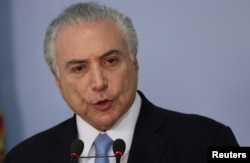Brazil's Congress is expected to reopen the door for a modest pension overhaul as soon as October, lawmakers said before returning to normal business on Thursday following a vote to block a corruption trial against President Michel Temer.
Still, legislators warned that Temer must spend some of his newfound political capital either on measures raising tax revenue or a new, less ambitious 2017 budget target. The choice could quickly put him at odds with allies and even erode market confidence in his austerity agenda.
Since May, uncertainty over whether Temer would be suspended from office and tried by the Supreme Court had paralyzed talks on a proposed pension reform, the cornerstone of the president's plan to eventual close Brazil's gaping budget deficit.
The government, emboldened by a 263-227 vote to block the charges on Wednesday, now wants to resume talks with legislators by early next week, gauging support for the proposal, a government source told Reuters, requesting anonymity to freely discuss the government's strategy.
Speaker Rodrigo Maia wants the lower house to vote on the reform by the end of August, he said earlier this week, which means the proposal could be approved by the Senate as soon as October, according to a second government source.
The government will not draw red lines in the negotiation, the first source added, in the hopes that lawmakers will agree to approve a meaningful overhaul now instead of resorting to piecemeal changes over the next few years.
Some remain skeptical that even a watered-down pension bill can pass, saying the window of opportunity for a pension reform may have closed ahead of next year's general elections.
The risk of prosecutors pressing new charges against Temer could also darken the outlook.
Prosecutor General Rodrigo Janot charged Temer last month with taking bribes from meatpacker JBS SA which the president denies. Congress voted on Wednesday to block those charges from proceeding to the Supreme Court, but Janot may still bring additional charges in the case.
Temer's opponents failed to have him stand trial for corruption, but they said his coalition emerged with a smaller majority from Wednesday's damaging vote and that will hinder approval of his unpopular agenda.
"Our strategy is to resist the reforms. The government has been weakened and will have greater difficulty getting pension reform through," said Carlos Zarattini, Workers Party leader in the lower house.
Fiscal Woes
Wary of opening new battle front, Temer is unlikely to move any time soon on a plan to simplify Brazil's tax system. But his government will need a quick answer to growing questions about missing its annual budget target.
So far Temer has raised fuel taxes, frozen spending and stepped up asset sales to avoid changing the target - a decision that investors could read as a sign of weaker fiscal discipline.
This week Finance Minister Henrique Meirelles reiterated the government's commitment to a 2017 fiscal deficit of 139 billion reais before interest payments.
The so-called primary deficit in the 12 months through June, however, rose to 167.2 billion reais, equivalent to 2.62 percent of gross domestic product and well above the official target.
Changing the target is a last-resort measure that could be announced later this month, the second government source told Reuters, adding that a new target would still not exceed last year's 161 billion reais deficit.
More tax increases could face stiff resistance in Congress.
"It will not be prudent to change the target," said Marcos Montes, whip of the government-allied Social Democratic Party (PSD) in the lower house. "But I don't think society would stand even higher taxes. The government will have to cut even deeper."






